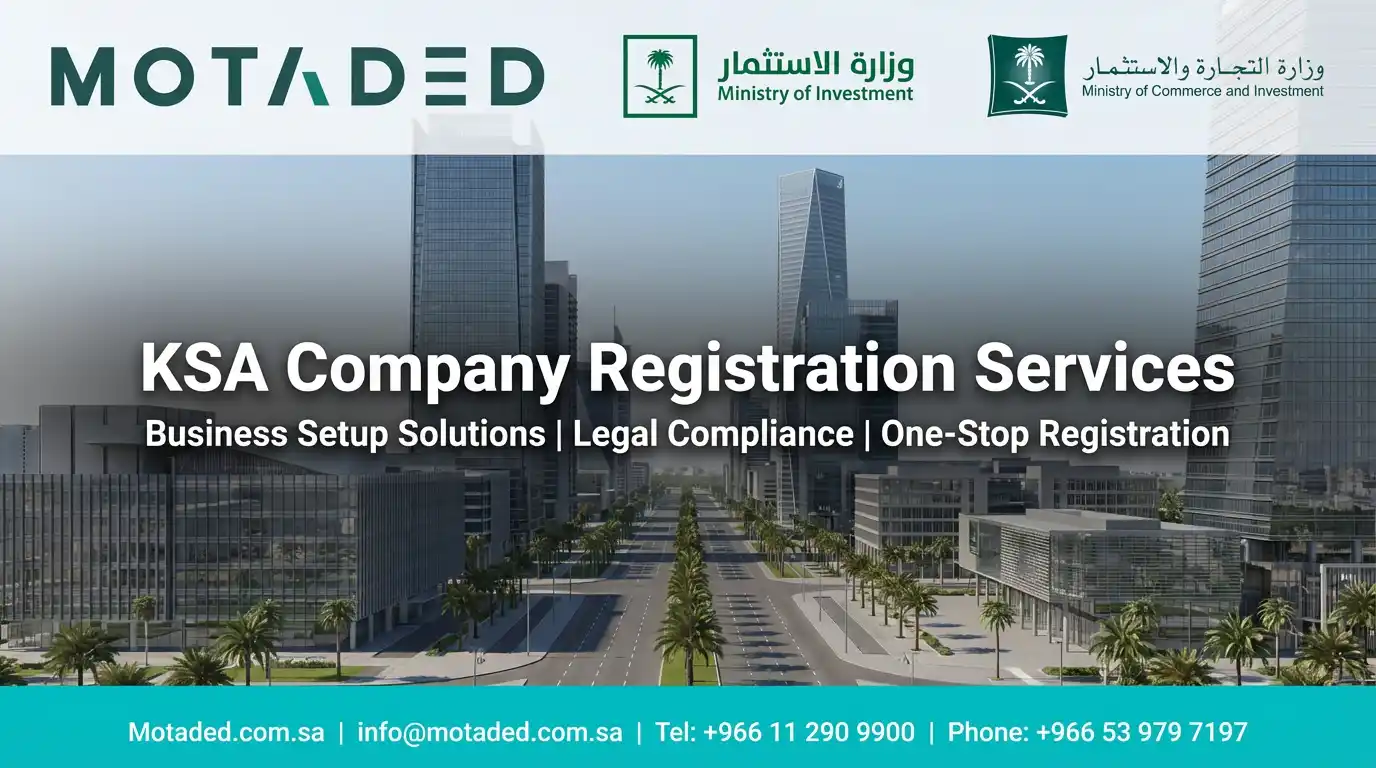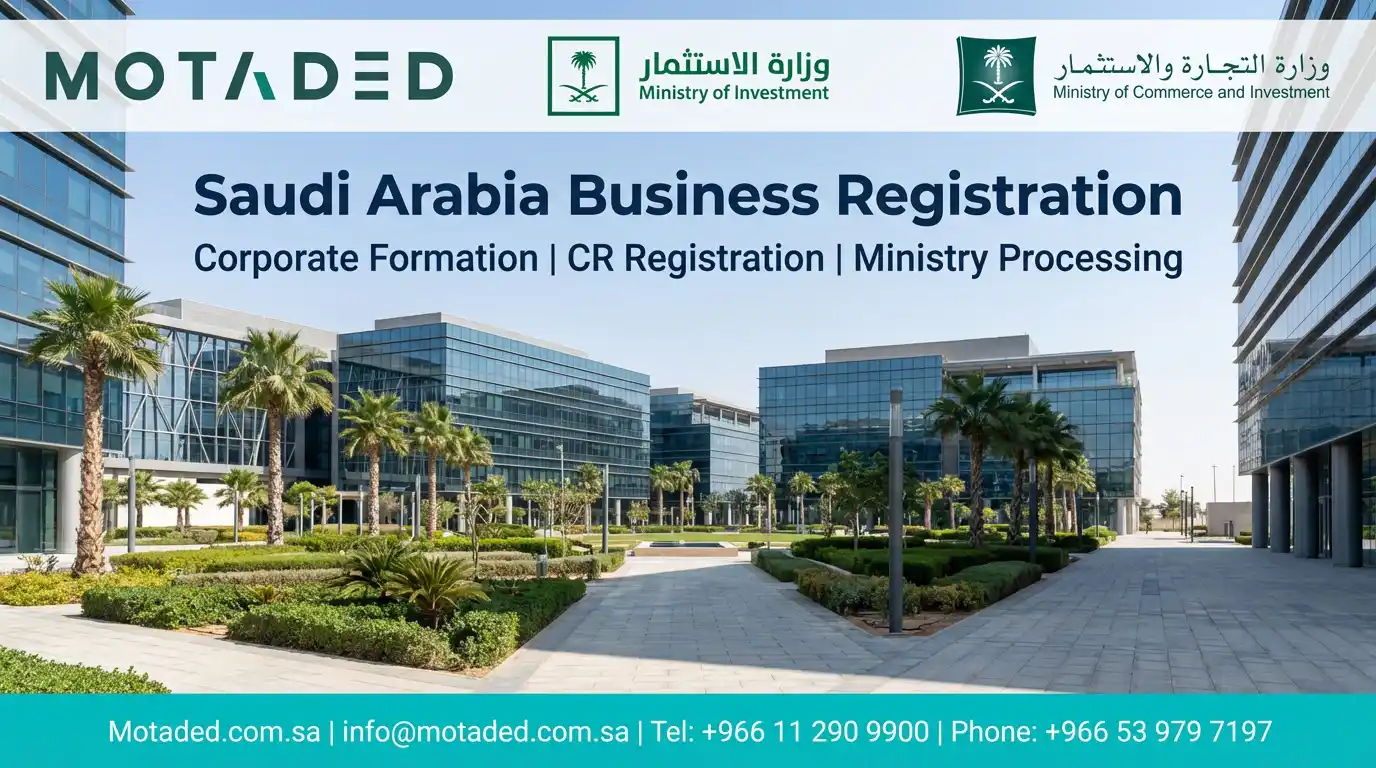Investment Sovereignty 2026: The Encyclopedic Thesis on Registering and Licensing Foreign Companies in Saudi Arabia
The decision to Register a company in Saudi Arabia in 2026 is the most influential strategic move in formulating the future financial solvency of international investment groups. Presence in the Kingdom is no longer merely an expansionary option; it has become a process of Formulating a sovereign legal identity that grants you the right to access the world's largest economic workshop driven by Vision 2030. At Motaded, we realize that mastering the tools of Investment Governance in Saudi Arabia is what grants investors absolute operational sovereignty. The comprehensive digital transformation led by the Ministry of Investment and the updated 2026 legislative framework ensures that foreign investors enjoy Freedom of Ownership in Saudi Arabia 100% Foreign Ownership, providing a fortified environment for asset growth and sustainable billion-dollar profits.

1. Regulatory Philosophy of MISA in the Era of "Sovereign Empowerment" 2026
The regulatory philosophy of the Ministry of Investment in Saudi Arabia for 2026 is based on the principle of "Investor as a Strategic Partner," where the Ministry has transitioned from a traditional regulatory body to a sovereign empowerer. As a leading Consulting Firm in Saudi Arabia for Investors, we confirm that this legislative shift ensures asset protection through the "New Investment Law" that came into effect in February 2025, which guarantees absolute equality between domestic and foreign investors. The system aims to attract qualitative capital that contributes to the GDP, providing a fast-track for projects aligned with the specific qualitative goals of Vision 2030.
Sovereign regulation in 2026 means that investors are no longer forced to navigate bureaucracy; the investment registration certificate is now issued with extreme immediacy. At Motaded, we guide our clients to leverage this stable environment to lay the foundations of their billion-dollar entities, benefiting from generous government support that has made the Kingdom the world's premier laboratory for the future of business. Joining this ecosystem means your company will be part of a global economy that knows no borders, supported by a legislative infrastructure that respects international contracts and obligations and provides a secure path for repatriating profits and managing billion-dollar assets with complete transparency and informational integrity.
2. Digital Harvest: Company Registration Statistics (Sovereign 2026 Data)
To ensure absolute informational integrity, the following table documents the boom in the pace of company registration for 2026 according to data from the Ministry of Commerce and the Saudi Business Center:
| Investment Performance Indicator 2026 | Achieved Value (or %) | Achievement vs. Target | Documenting Authority |
|---|---|---|---|
| New Foreign Commercial Registrations | +22,000 Records | Surpassed Annual Target | Ministry of Commerce |
| Foreign Direct Investment (FDI) Inflows | $28.5 Billion | Sustainable Growth | Ministry of Investment |
| Digital CR Issuance Speed | Under 30 Minutes | Instant (Real-time) | Saudi Business Center |
| 100% Foreign Ownership Rate | 85% of New Licenses | Full Investment Sovereignty | Invest Saudi Portal |
These metrics reflect the regulatory solvency enjoyed by the Saudi economic fortress, providing a secure environment for international investors to effectively manage their cadres.
3. Structuring Legal Identity: Choosing the Optimal Commercial Entity 2026
The step of choosing a legal entity is the fundamental pillar in Registering a company in Saudi Arabia. In 2026, the Limited Liability Company (LLC) emerges as the preferred choice for international investors due to its flexibility and protection of partners' financial liability. At Motaded, we handle the Formulating of Articles of Association to ensure the protection of all parties' rights, with a commitment to Legal Translation Services in Saudi Arabia to ensure sovereign documents align with updated laws.
Choosing the correct legal entity is directly linked to the Steps for Business Setup in KSA; while some prefer foreign branches to maintain direct links with the parent company, others choose Simplified Joint Stock Companies to enjoy flexibility in share trading. Sovereignty in choosing the legal structure grants the establishment immunity against future disputes and facilitates accreditation with billion-dollar banks. We ensure our clients' legal structures are designed to support expansion and growth, enhancing credit solvency and making them eligible for strategic partnerships with major sovereign funds in the Kingdom for 2026.
4. MISA Investment License: The Gateway to the Economic Fortress
The MISA Investment License is the primary sovereign document that legitimizes your presence in the Kingdom. In 2026, procedures for obtaining this license have been simplified through the unified "Invest Saudi" portal. At Motaded, we take responsibility for the proactive auditing of all parent company documents to ensure application approval within 5 to 7 business days. Informational integrity in presenting the company's strategic plan is what guarantees access to billion-dollar investment incentives.
The license requires the submission of authenticated (Apostille) documents, including the parent company's commercial register and audited financial statements for the last year. Sovereignty in 2026 means the MISA license is no longer just a permit but a partnership contract with the state, granting you the right to own commercial real estate and international recruitment freedom. We ensure our clients' investment files are meticulously formulated to highlight added value to the Saudi economy, enhancing their priority in Special Economic Zones and ensuring access to all tax and logistical advantages available for 2026.

5. Procedural Sovereignty via the Saudi Business Center (SBC)
The Saudi Business Center (SBC) in 2026 represents the pinnacle of organizing sovereign procedures, where services from over 70 government entities have been integrated under one digital platform. Procedural sovereignty means your establishment starts practicing its business immediately upon digital formation, without the need for fragmented traditional reviews. At Motaded, we manage this digital interface on your behalf to ensure data updates and automatic linking with the files of all relevant ministries.
The real-time linkage between "SBC" and all ministries ensures informational integrity and eliminates bureaucracy, granting the establishment a superior ability to activate the Commercial Registration and start signing billion-dollar contracts. In 2026, the Kingdom does not require investors to review post offices or chambers of commerce separately; instead, the National Address and municipal licenses are activated instantly upon CR issuance, reducing the time required to start actual operational activities to record-breaking global levels and preserving the billion-dollar investor's time.
6. HR Governance and Human Sovereignty (Nitaqat 2026)
Establishment commitment to MHRSD regulations in 2026 is the only guarantee for operational stability. Human sovereignty means the ability to attract Professional Staff in Saudi Arabia and integrate them into a global work environment via the "Qiwa" platform. At Motaded, we provide HR Outsourcing in Saudi Arabia to help establishments document contracts and manage qualitative nationalization files.
In 2026, nationalization is no longer just about numbers; it has become an investment in the Saudi mind trained in the world's best universities. Compliance with the Wage Protection System in Saudi Arabia is a sovereign condition that does not tolerate compromise, as all financial flows for employees are monitored via the "Mudad" platform to ensure rights and transparency. The smart investor builds their team from local talent possessing loyalty and deep market knowledge, enhancing informational integrity and sustainability within the establishment, reducing reliance on expatriates in leadership roles, and fulfilling Vision 2030 targets for sustainable job creation.
7. Financial Solvency and Activating the Sovereign Bank Account
The ninth stage of formation—Opening a Bank Account in Saudi Arabia—represents the decisive step to activate capital and start Cash Flows in Saudi Arabia. In 2026, Saudi banks are directly linked to Ministry of Commerce and Ministry of Investment data for real-time verification of partners and authorized managers. At Motaded, we facilitate these sovereign financial procedures to ensure your corporate account is activated in record time.
Activating a bank account requires high informational integrity in submitting "Know Your Customer" (KYC), where all capital is verified according to Saudi Central Bank (SAMA) standards. Financial sovereignty in 2026 means possessing the ability to conduct international transfers and pay salaries and dues from the first day of work, protecting investor financial solvency and enhancing establishment transparency before regulatory and billion-dollar banking authorities. We ensure our clients' financial procedures are fortified and compliant with anti-money laundering regulations, consolidating the establishment's prestige as a globally and locally trusted economic entity.
8. Tax Sovereignty and Financial Compliance with ZATCA 2026
The Zakat, Tax and Customs Authority (ZATCA) is the financial guardian of the Saudi economy in 2026. Tax sovereignty means absolute compliance with the comprehensive e-invoicing system that prevents evasion and provides a fair competitive environment. At Motaded, we handle the Formulating of the accounting and tax framework for your company to ensure compliance with Corporate Income Tax in Saudi Arabia at a rate of 20% on profits.
Compliance with "Fatoora" e-invoicing requirements is not just a technical procedure; it is a sovereign documentation of all commercial operations ensuring informational integrity before regulatory authorities. In 2026, tax reports are linked in real-time to the Authority's platform, requiring extreme precision in calculating VAT and Withholding Tax. We provide our clients with tax compliance services that protect their billion-dollar solvency from penalties and fines, ensuring they obtain necessary certificates to participate in major government contracts, enhancing financial stability and sustainable growth in the Saudi economic fortress.

9. Special Economic Zones (SEZ): Oases of Investment Sovereignty
Special Economic Zones in 2026 represent the peak of investment empowerment, offering sovereign incentive packages including 5% corporate income tax for up to 20 years, along with comprehensive customs and tax exemptions. Sovereignty in these zones means working in a flexible regulatory environment aimed at promoting innovation and manufacturing. At Motaded, we guide investors to choose the zone that fits their strategic activity, such as King Abdullah Economic City or Jazan.
Investing in these zones provides global groups with a superior ability to compete globally by reducing total costs and ensuring rapid market access. These zones also grant flexibility in attracting global talent and exemptions from expat fees for specialized labor during the first five years. Presence in a Saudi SEZ is equivalent to obtaining a "Sovereign Passport" for billion-dollar growth in an environment fortified by all means of government support and empowerment for 2026.
10. Residency and Labor Governance: Procedural Sovereignty for International Cadres
Managing work visas and residency permits (Iqama) in 2026 is an authentic part of an establishment's operational sovereignty. The Kingdom has abolished the traditional "Sponsorship" system and replaced it with the "Contractual Relationship Improvement" initiative, granting international employees greater flexibility and ensuring employers' rights through sovereignly documented contracts. At Motaded, we ensure the execution of all human cadre procedures with utmost precision via Muqeem and Absher Business platforms.
In 2026, employee classification has become skill-based, requiring companies to update their cadres' data to ensure obtaining "High-Skilled" visas. Sovereignty here lies in the ability to transfer global expertise to work on billion-dollar projects within the Kingdom without administrative obstacles. We help companies manage the employee lifecycle from arrival to final departure, ensuring compliance with all occupational safety standards and sovereign health insurance, enhancing the establishment's attractiveness to global talent and achieving operational sustainability in a legally and procedurally fortified environment.

11. Foreign Real Estate Ownership Law 2026: New Frontiers of Sovereignty
The "Real Estate Ownership Law for Non-Saudis" came into full effect in January 2026, revolutionizing the concept of real estate sovereignty for investors. The law abolished the 30 million SAR minimum threshold for purchasing land or buildings for investment and opened the door for ownership in broad strategic areas. At Motaded, we handle the Formulating of real estate ownership files to ensure alignment with updated geographical regulations.
The new law defines "Non-Saudi" to include companies established outside the Kingdom and foreign non-profits, while granting Saudi companies with foreign shareholders the right to own property in Makkah and Madinah for specific approved commercial purposes. Real estate sovereignty in 2026 means owning the assets necessary for activity and securing professional staff housing, reducing the burden of rental costs and maximizing the value of billion-dollar establishment assets. We ensure our clients informational integrity in documenting deeds and compliance with sovereign property transfer fees, stabilizing their real estate investments in the Kingdom.
12. Government Relations Management (GRO) and the Procedural Shield 2026
The advanced investment environment in 2026 requires daily, precise management of digital government relations. Motaded provides a procedural shield through our PRO services in Saudi Arabia, ensuring Commercial Registration renewals, contract documentation, and license activation instantly. The operational sovereignty of the establishment depends on a partner with proactive government compliance monitoring tools to avoid billion-dollar fines resulting from delays.
Under updated 2026 regulations, a delay in updating CR data or the National Address may lead to instant service freezing; thus, utilizing a service provider with deep knowledge of the Steps for Business Setup in KSA is a strategic necessity. We take responsibility for informational integrity in all government transactions, giving senior management peace of mind to focus on business development and achieving sales targets. Our role as a sovereign GRO is to ensure your establishment always remains in the High Green zone, facilitating access to all government privileges and empowerment support for distinguished companies.
13. Personal Data Protection Law (PDPL): Informational Sovereignty
The Personal Data Protection Law (PDPL), which has entered full enforcement, represents a fundamental pillar in the 2026 business environment. Informational sovereignty means protecting client, employee, and partner data according to global standards that prevent leakage and violation. At Motaded, we ensure your company’s systems comply with the regulations of the Saudi Data and AI Authority (SDAIA).
Compliance with PDPL is not just a legal procedure; it is protection for the establishment's prestige and informational solvency in the digital economy era. In 2026, penalties for data leakage include billion-dollar fines that may threaten the survival of investment entities. We help companies build a "Privacy Framework" and clearly document consent, enhancing the establishment's reputation as a trusted partner and protecting its knowledge assets. Informational sovereignty is the new oil of the Riyadh-based global economy, and mastering it gives your company a major competitive edge in winning consumer and investor trust alike for 2026.

14. Sovereign Inquiries on Company Registration and Licensing 2026 (FAQ)
Here are the 9 fundamental inquiries to ensure your informational sovereignty when planning to register your business in 2026:
- What is the Saudi Business Center's role in licensing? It is the unified sovereign interface that concludes all license procedures (Commerce, Investment, Municipal, Zakat) in one digital platform to ensure procedural sovereignty.
- Can foreigners own real estate commercially in the company's name? Yes, 2026 regulations grant real estate ownership rights to establishments with an investment license for their documented activities without a specific financial cap.
- How is the "National Address" activated for new establishments? It is done automatically through sovereign linking between the Ministry of Commerce and Saudi Post (SPL) upon CR issuance.
- What is the fine for non-compliance with the Wage Protection System (Mudad)? It starts at 3,000 SAR per employee and can lead to freezing all government services and the establishment's CR after three months of violation.
- Does the MISA license replace the Commercial Registration? No, the license is the sovereign approval that allows you to Register a company in Saudi Arabia and issue the CR from the Ministry of Commerce.
- What is the impact of PDPL on establishments? It mandates strict encryption and protection standards and prohibits processing personal data without explicit consent to ensure informational integrity.
- Can a foreign branch be converted into an independent LLC? Yes, the Ministry of Investment allows for Amending the MISA Investment License to change the legal entity.
- What is the advantage of HR outsourcing to "Motaded"? It ensures procedural integrity, reduces administrative costs, and guarantees absolute compliance with all 2026 legislative updates.
- How does Motaded ensure the registration request is safe from rejection? By proactively auditing all documented files and ensuring they align with the Market Entry Strategy in KSA.
15. Financial Strategy: Governing Capital and Billion-Dollar Flows 2026
Establishment financial solvency in 2026 relies on precise governance of capital deposit operations and operational expense management. Financial sovereignty means compliance with electronic "Know Your Customer" (KYC) requirements imposed by sovereign banks. At Motaded, we Construct financial monitoring systems that ensure the accuracy of reports submitted to regulatory authorities.
In 2026, cross-border cash flows are monitored to ensure source integrity and compliance with anti-money laundering regulations. Informational integrity in financial management enhances the company's credit rating and facilitates obtaining billion-dollar credit lines for expansion. We provide our clients with periodic financial position analyses ensuring sustainable liquidity and shareholder rights protection, making the establishment an economic fortress capable of facing global market fluctuations with absolute sovereign efficiency, achieving the highest ROI in the promising Saudi market.
16. Executive Summary and Investment Sovereignty 2026
Registering your business in Saudi Arabia for 2026 is the safest and most profitable decision in the new global economy. Stunning digital development, procedural sovereignty, and legislative clarity under Vision 2030 have made the Kingdom the top destination for billion-dollar capital. At Motaded, as your strategic and sovereign partner, we are committed to overcoming all obstacles and providing knowledge and technical support to ensure your success and sustainable growth in the land of opportunity.
Your successful investment in Saudi Arabia today is the cornerstone of your global economic status tomorrow. We ensure absolute compliance and procedural sovereignty at every step, confirming that the Saudi economic fortress opens its doors to every ambitious leader. With proper planning and a refined Market Entry Strategy in KSA, your billion-dollar ambitions will transform into a tangible reality building the future global economy from the heart of the Kingdom for 2026.